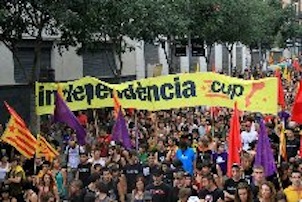With delegates from Independence to Change All attending the Radical Independence Conference in Glasgow, Duncan McCabe of Dundee RIC looks at the current situation in Catalunya.

Freedom Come All Ye
Back in the mid-eighties 25000 anti-nuclear protesters took part in a CND-organised ‘Hands Across Scotland’ human chain. That was quite a show of solidarity, but it was nothing compared to the Catalan Way event on 11th September this year when an estimated 1. 6 million Catalans linked hands from the French border to the Mediterranean coast south of Barcelona.
Never before has the cry “Visca Catalunya! “, reputedly the last words of Catalan Generalitat President Lluis Company’s before his execution in Montjuich Prison, Barcelona in October 1940, echoed so loudly. Around half of the country’s 7.5 million citizens, if recent opinion polls are any guide, are now backing full independence with even more supporting demands for a referendum.
However on 7th November this year, an unholy alliance of Socialists and Conservatives in the Catalan parliament voted down proposals from the community-based, radical left Popular Unity Candidacy (CUP) to unilaterally hold such a referendum, preferring instead to take the slow, begging bowl approach of seeking central government approval.
Catalan politics has never been straightforward, with a mesh of coalitions and groupings vying for political power; continual tensions between localities, parliament and the central government in Madrid; and a strong extra-parliamentary tradition. This extra-parliamentary tradition has powerfully reasserted itself in recent years as grassroots pressure for independence has forced the mainstream parties to sit up and take notice.
The movement Independència per canviar-ho tot – http://www.percanviarhotot.cat/Independence to Change All (IPCT), is the radical independence movement of Catalunya, and has opened the door for the new pro-indy political party the CUP to win three seats in the 2012 elections and breath fresh life into parliamentary politics. As I write, CUP deputy David Fernandez is facing right-wing criticism for removing and waving his shoe at the unapologetic former Bankia President and IMF Director-General Rodrigo Rato, whose role in the financial crisis and the Iraq war
Fernandez forcefully condemned in the Catalan Parliament.
The current constitutional situation is a direct result of challenges to many of the provisions of the Statute of Autonomy, restored to Catalunya in 1978 following Franco’s death, by the right wing Peoples’ Party some of which were upheld by the Constitutional Court in 2006.
Since then mass participation, grassroots campaigns, many of which have been organised by IPCT, have propelled independence into the forefront of the political debate. These have included a series of unofficial municipal referendums which have seen support of up to 95% for independence, mass rallies and this year’s Catalan Way.
It was the September 2012 demonstration, which brought out more than a million people under the slogan ‘Catalunya, new state in Europe’, that was the game changing event. Following this the ruling Convergence and Union (CiU) coalition decided to support the demand for a referendum and the Liberal part of the coalition has now come out in support of independence: the first time a Nationalist party in Spain has declared for independence.
However, their talks with the PPC controlled central government for greater fiscal autonomy broke down and led to the fresh elections, almost exactly a year ago, when the CUP made their first appearance on the electoral stage, and theoretically pro-referendum parties won almost 60% of the vote. The election polarised the situation with both pro and anti-independence parties gaining support while the vacillating middle, the CiU and the Catalan Socialists (PSC), lost ground.
Catalunya’s history of medieval independence followed by cultural and political suppression by a centralised state; rapid industrialisation and the growth of left-wing ideas (leading to the introduction of Europe’s first eight-hour working day in 1919); and continually contributing more in tax revenue than they get back, mirrors much of the Scottish experience. As we both move rapidly towards independence the similarities continue with progressive and alternative ideas from the grassroots shifting the more traditional nationalist agendas firmly towards the left.
Alongside the unexpected electoral success of the Euskal Herria Bildu left/nationalist coalition in the Basque parliamentary elections of October 2012, it begins to look as though autonomist, anti-austerity politics are making a breakthrough which could not only create new hope in these particular countries, but begin to reshape Europe by putting people, rather than big business, at its heart.
Certainly there is no doubt that the independence campaign in Scotland will have a significant impact on events and a decisive Yes vote next September, coming only a week after Catalunya’s national day, could be the catalyst which propels them to freedom too.
(also see:-When Will We See Tanks In Barcelona?)
